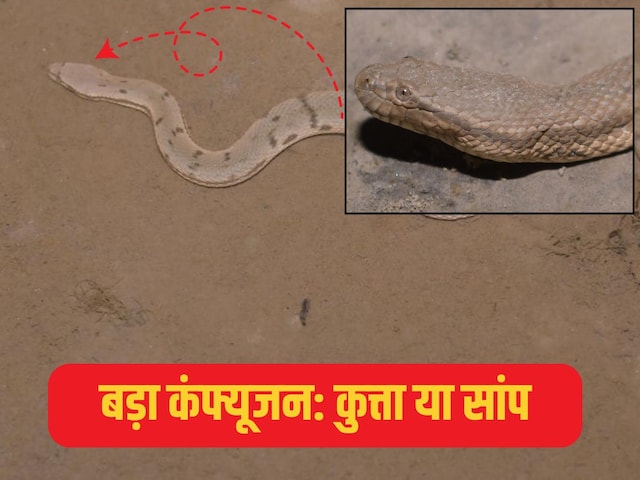technology
aasam snake news, Assam flooded ground, Assam snake discovery, Assam snake news, Cerberus Rynchops, Dog -snake, Dog-Facted Water Snake, Latest snake news, Nalbari district, Reptile specialist, Sarberus rhincops, Snake, Snake discovery in Assam, Snake ka photo, snake latest news, snake news, Snake News in Hindi, Snake News India, snake news today, snake pass latest news, Snake Rescuers, Update on snake, Water snake
mohitmittal55555@gmail.com
0 Comments
Snake News: Sensational search dog -like face, snake -like tricks, where this unique discovery surprised! – Snake Ka Photo Dog Faced Water Snake Found in Assam Floodplain 800 km from Coast Link With Bangladesh
Last updated:
Snake Ka Photo: For the first time in the Nalbari district of Assam, a dog -like water snake (Serburus rhinakops) was seen, which was found in flooded plains, 800 km from the sea. Reptiles expert Jayaditya Purakayastha and Snake Save …Read more

Snake with a dog’s face found in Assam
Highlights
- Something similar was seen in Assam’s Nalbari district
- A dog -like snake was first seen in Northeast India.
- The snake rescue team saw this unique snake in the flood -affected plains of Garaimara.
Have you ever heard that the snake living on the sea shore is having fun in the flood -affected plains of the forest? A similar surprising view was seen in Nalbari district of Assam, where the Cerberus Rynchops with a dog -like face was first seen in Northeast India. This place is about 800 km from its normal coastal house i.e. miles from Sonadia Island in Chittagong Division of Bangladesh!
Jaiditya Purkayastha, an expert of sea snakes in Guwahati and their snake rescue team saw this unique snake in the flood -affected plains of Garaimara. His discovery surprised the scientists and its full details have been published in the latest issue of Reptails and Emphibans magazine.
Who is this dog like a dog?
This snake is not an ordinary creature! Its name is Serberus Rignacops, which is mild toxic and semi-gentle. It is accustomed to living in saltwater and hunts fish and crusts in shallow water. Its strategy is also amazing, it does ‘sit and wait’ and as soon as the opportunity is received, the hunting pounces. Usually this snake is found in mangrove forests, coastal mud plains and mouths of South and South-East Asia. In India, it has been seen in coastal areas like Gujarat, Maharashtra, Kerala, Odisha, Tamil Nadu, Telangana and Andaman and Nicobar but its presence in inland areas? It has become a puzzle for scientists!
How did this guest reach in Assam?
Reptiles experts are surprised by this discovery. After all, how did this snake come to the forests of Assam so far from the sea? Is this the result of the changing environment or the amazing of this snake’s adaptation capacity? Jayaditya and his team say that more research is needed on the spread routes and ecological adaptation of this species. This will help us understand how this snake can survive beyond its normal limit.
Real heroes who rescue snakes!
The credit for this discovery goes not only to scientists, but also to those snake rescuers (rescue), who played an important role in this mission. Jayaditya Purkayastha, who heads the biodiversity NGO Help Earth, has told The Hindu that this study was not possible without the cooperation of local snake rescuers. We have to pay attention to their training and capacity building, not only to save snakes, but also to collect data on the variety, distribution and seasonal patterns of the species.
He further stated that snake rescuers are a precious resource in biodiversity research. With correct training they can make a big contribution to scientific discoveries and conservation plans. Jayaditya has supported a long -term snake rescue plan in which rescuers are added to a formal network, giving them scientific training, standardized data collection protocols and real time monitoring equipment. He further said that such an initiative will not only improve rescue operations, but will also make it possible for a large-scale study on hotspots, migration trends and seasonal activities of human Samping struggle. This will make it easier to create evidence-based conservation strategies.
Share this content:














Post Comment